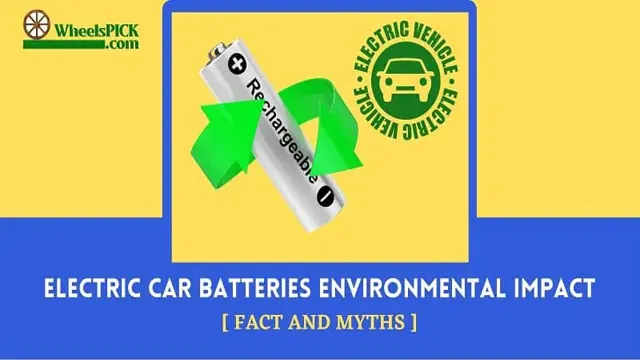Revolutionizing Transportation: The Environmental Impact of Electric Car Batteries in Canada
Electric vehicles have been around for quite some time now, but it is only in recent years that they have started becoming popular. However, one of the biggest concerns for potential buyers is the range that an electric car can cover on a single charge. The answer to this concern lies in the electric car batteries in Canada.
Canada is one of the leading countries when it comes to electric car technology, and its battery manufacturing industry is booming. With the shift towards greener transportation, car manufacturers are investing heavily in creating high-quality, durable, and long-lasting batteries. But why is Canada a hub for electric car batteries? Well, it has a lot to do with the country’s natural resources.
Canada is rich in minerals like lithium and cobalt, which are essential components in the manufacturing of electric car batteries. As a result, many battery manufacturing companies have set up shop in Canada to take advantage of these resources. In this blog, we will explore the current state of the electric car battery manufacturing industry in Canada.
We’ll dive into the latest technologies being used, the companies leading the charge, and what we can expect in the near future. So, buckle up and get ready to explore the world of electric car batteries in Canada!
Environmental Impact
Electric car batteries have become a popular alternative to gasoline-based cars, but what is their environmental impact? While electric cars may be less harmful to the environment during their lifetime, the production of their batteries has a significant impact. In Canada, the mining of raw materials required for producing these batteries can result in damage to the environment, including deforestation, disruption to wildlife habitats, and increased pollution. Additionally, battery manufacturing itself requires a considerable amount of energy and produces greenhouse gas emissions.
Proper disposal of the batteries at the end of their lifespan is also a concern, as the materials used can be hazardous to the environment if not handled properly. Despite these challenges, efforts are being made to improve battery production and disposal practices to reduce their overall impact on the environment. As electric cars become more common, it is vital to address the environmental concerns surrounding their batteries to ensure a sustainable future.
Current State of the Industry
The current state of the environmental impact in the industry is concerning. The industries are continuously producing and emitting pollutants that harm the environment. We have seen a significant increase in carbon dioxide emissions due to the high usage of fossil fuels.
This contributes to global warming and has a severe impact on climate patterns. Recently, there has been a push towards eco-friendly and sustainable practices. The industry has been looking for ways to reduce emissions by using renewable energy sources and implementing efficient technologies.
It’s crucial for the industry to adopt these sustainable practices as it will not only help the environment but also benefit the company’s bottom line. It’s time for us to take responsibility and make a concerted effort to reduce our environmental impact. By doing so, we will be protecting our planet for generations to come.

Lifecycle Assessment of EV Batteries
As the world continues to move towards sustainable energy sources, electric vehicles (EVs) are gaining in popularity. However, with the increased use of EVs comes the issue of what to do with the batteries once they reach their end-of-life. A lifecycle assessment (LCA) can help to understand the environmental impact of these batteries.
EV batteries are generally made up of components such as lithium, cobalt, and nickel. These materials are mined from the earth, and the processes used to extract them can have negative environmental consequences. Additionally, the production and transportation of batteries also contribute to greenhouse gas emissions.
However, when these batteries are recycled at the end of their lifespan, it can have a significant positive environmental impact by reducing the need for new materials to be mined. Overall, it’s important to weigh the environmental impact of EV batteries throughout their entire lifespan when considering the impact of electric vehicles on the environment.
Positive Impact on the Environment
When it comes to the environmental impact of electric car batteries, Canada is setting a positive example. Electric cars are powered by lithium-ion batteries, which are far less damaging to the environment than traditional gasoline-powered cars. Although lithium is a finite resource, it is recyclable and can be used for multiple generations of batteries.
In Canada, there has been a push to develop a domestic lithium-ion battery industry, which would reduce the need for importing batteries and further lower the environmental impact of electric cars. Additionally, the Canadian government offers rebates and incentives for consumers who purchase electric cars, making them more accessible and encouraging wider adoption. With the rise of electric cars, Canada is positioning itself as a leader in sustainable transportation, and it’s exciting to see the positive impact this shift will have on the environment.
Reduced Carbon Emissions
Reduced Carbon Emissions Reducing carbon emissions has become an essential issue, and there are several ways it can positively impact the environment. By reducing our carbon footprint, we can help prevent global warming, which leads to devastating climate changes. Burning fossil fuels like coal, oil, and gas adds carbon dioxide to the Earth’s atmosphere, trapping heat and causing the planet to warm.
This warming effect can lead to droughts, floods, and extreme weather patterns that disrupt ecosystems and endanger wildlife. By reducing our carbon emissions, we can help slow down this process and mitigate the damage. One of the most effective ways to reduce carbon emissions is to use clean, renewable energy sources like solar, wind, and hydropower.
Unlike fossil fuels, these energy sources don’t produce carbon emissions during operation, which can significantly reduce our carbon footprint. By investing in clean energy and supporting policies that promote its use, we can create a more sustainable future for ourselves and the planet. Aside from using renewable energy, there are other ways to reduce carbon emissions.
By making small changes to our daily habits like turning off lights when we leave a room, biking or walking instead of driving, and reducing meat consumption, we can help lower our carbon footprint even further. These may seem like small actions, but when combined on a larger scale, they can make a significant impact on reducing carbon emissions. In conclusion, reducing carbon emissions is critical for the environment and our future survival.
By using clean, renewable energy sources and making small changes to our daily habits, we can help reduce our carbon footprint and slow down the effects of global warming. We all have a responsibility to take care of the planet, and reducing carbon emissions is one way we can make a positive impact.
Decreased Reliance on Fossil Fuels
The decreased reliance on fossil fuels has had a significant positive impact on the environment. As we become more aware of the effects of our actions on the planet, we have come to realize that continuing to rely on energy sources that harm the environment is not sustainable. By moving towards renewable energy sources like solar, wind, and hydroelectric power, we are reducing our carbon footprint and reducing our impact on the environment.
Not only do these sources of energy produce fewer emissions, but they also help to preserve vital ecosystems that are affected by fossil fuel use. This shift in energy consumption habits has also led to a rise in green jobs and a thriving green economy. By embracing renewable energy sources, we are not only helping the environment but also creating a more sustainable future for ourselves and future generations.
Promotion of Renewable Energy Sources
Renewable energy sources have a significantly positive impact on the environment. By promoting the use of renewable energy, we’re reducing our reliance on non-renewable fossil fuels that have a detrimental effect on the environment. The use of fossil fuels is one of the leading causes of climate change, which has far-reaching consequences, including rising sea levels and devastating natural disasters.
When we use renewable energy sources, we’re reducing our greenhouse gas emissions, which are responsible for climate change. The energy generated from renewable sources is also cleaner, reducing the amount of air and water pollution that’s produced by traditional energy sources. By using renewable energy sources like solar and wind, we’re not only improving the environment but also creating a more sustainable future for ourselves and generations to come.
Challenges and Solutions
Electric car batteries are a popular topic of discussion in Canada and around the world due to their potential environmental impact. While electric cars are praised for being a greener alternative to traditional gasoline-powered vehicles, the process of producing and disposing of their batteries can create negative consequences for the planet. One of the main challenges is finding a way to responsibly recycle or dispose of these batteries once they have reached the end of their life cycle.
However, there are solutions being developed to tackle these issues, such as implementing more sustainable materials in battery production and creating efficient recycling processes. By addressing these challenges head-on, we can work towards reducing the impact of electric car batteries and creating a more sustainable future for ourselves and the planet.
Sustainable Materials and Processes
Sustainable materials and processes have become increasingly important as we strive to reduce our impact on the environment. The challenges associated with this goal are numerous, from finding materials that are both sustainable and durable, to developing processes that minimize waste and energy consumption. Fortunately, there are solutions available that can help us overcome these challenges.
One solution is to utilize recycled and upcycled materials. By using materials that have already been produced, we can reduce the demand for new, virgin materials and prevent them from ending up in landfills. Another solution is to implement closed-loop production systems that allow materials to be reused and recycled in a continuous cycle.
In addition to these solutions, innovative technologies such as 3D printing and bioplastics offer potential for reducing waste and minimizing energy consumption in the manufacturing process. While there are certainly challenges to implementing sustainable materials and processes, there are also many promising solutions available that can help us work towards a more sustainable future.
Recycling and Repurposing Strategies
Recycling and repurposing have emerged as critical strategies to tackle the planet’s burgeoning waste problem. However, these processes come with a set of challenges that must be addressed. One of the most significant obstacles is the inadequate infrastructure, which limits the recycling process’s efficiency.
Many regions lack the necessary collection and processing systems, making it difficult to recycle waste. Another challenge is educating people about recycling and repurposing, which remains the most fundamental aspect of waste reduction. Effective communication can help individuals understand the environmental and economic benefits of recycling and repurposing.
To address these challenges, innovative solutions are needed, such as incentivizing behavioral changes and investing in the development of alternative materials that can be recycled or repurposed. By incorporating these solutions, we can move towards more sustainable, waste-free societies.
Future Outlook
Electric car batteries have become a key topic in the automotive industry, especially in Canada, where environmental impact has been a major concern. The good news is that electric vehicles have been shown to be more environmentally friendly than gasoline-powered cars, but it’s important to remember that the production and disposal of electric car batteries can still have a significant impact on the planet. To address this issue, many Canadian companies are investing in research to reduce the environmental impact of electric car batteries, including exploring alternative materials and improving recycling processes.
Additionally, the Canadian government has committed to investing in sustainable energy initiatives, which will further support the growth of electric vehicles and their batteries. Ultimately, only time will tell what the future holds for electric car batteries in Canada and the rest of the world, but with ongoing efforts to minimize environmental impact and a greater push towards sustainable transportation, the future looks bright.
Conclusion
In conclusion, electric car batteries have the potential to significantly reduce our environmental impact in Canada. While the production of these batteries does have a carbon footprint, the ongoing benefits of using them far outweigh the initial costs. Not only do they drastically reduce greenhouse gas emissions, but they also help to decrease our reliance on fossil fuels and promote a greater use of renewable energy sources.
So, the next time you hit the road in your electric car, take comfort in knowing that you’re making a positive impact on the environment, one battery charge at a time.”
FAQs
What is the current state of electric car batteries in Canada?
Electric car batteries in Canada are advancing rapidly, with major investments being made in research and development to improve their performance and reduce their environmental impact.
How do electric car batteries impact the environment?
Like all batteries, electric car batteries have an environmental impact, particularly during the mining and extraction of metals such as lithium and cobalt. However, they have the potential to greatly reduce carbon emissions from the transportation sector.
What efforts are being made in Canada to improve the sustainability of electric car batteries?
There are various initiatives underway in Canada aimed at improving the sustainability of electric car batteries. These include increased recycling efforts, the development of more sustainable sourcing methods for raw materials, and the use of alternative materials such as solid-state batteries.
Are there any risks associated with electric car batteries?
Like any technology, there are some risks associated with electric car batteries, such as the potential for battery fires or explosions. However, these risks are decreasing as battery technology improves, and proper safety protocols are put in place.






